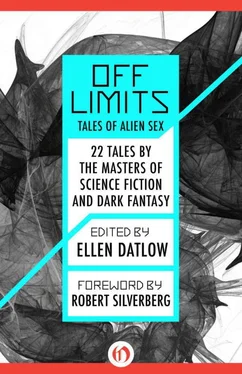At about 1:00 A.M., and inevitably by 2:00 A.M., Eunice’s eyelids began to grow heavy. The room dissolved to shifting, eerily oscillating planes of light and shadow. There was a muffled Eeeeee sound somewhere close by, a faint scratching at the door. Eunice knew she was losing consciousness, and thus control; knew this was dangerous; yet could not forestall the process though she shook her head, slapped her cheeks, forced her eyes open wide. A tarry-dark tide rose about her, and in her.
The dream-catcher at the foot of her bed! During the day, she never thought of it—never thought to remove it; at night, it was too late.
So she sank into sleep. Helpless. And he took immediate advantage.
Brashly entering her bedroom, pushing the door open as if—there was no door, at all.
The creature was physically mature now. Of that there could be no question. However he presented himself by day, his Eeeee? eeee? eeeyah? bleating and pleading, by night he was far different. The size of an adult man, with compact, muscled arms, shoulders, thighs. Covered in coarse black hairs. His eyes glaring, he yanked the bedclothes off Eunice, despite her protests; he gripped her so tightly, she thought he would break her ribs. In the morning, her body would be covered in bruises. In oddly lovely patterns. He mouthed her breasts, which had grown abnormally tender, her nipples sensitive to the slightest touch as they had never before been in Eunice’s life, her belly which was slick with perspiration, the secret flesh between her legs at which, at the age of thirty-seven, Eunice never once glanced, and rarely touched except to cleanse, and dry. No. Stop. I hate this. This is not me! Yet she found herself desperately embracing the creature, even as he penetrated her body, as a drowning person might embrace anyone, anything—Eunice’s arms, her trembling legs, her ankles locked together, gripping his legs between hers. Sometimes, a scream awoke her—a woman’s scream, high-pitched, helpless. Horrible to hear.
Eunice pushed at the bedclothes that were suffocating her, forced herself free. The bedside lamp was still burning. It might be only 1:35 A.M., it might be 4:00 A.M., the dead of night. The liquid silence of night. Utter unspeakable loneliness of night. The door to Eunice’s bedroom was shut again, of course—locked.
Yet the bedclothes, and Eunice herself, smelled of him. Damp, disgusting. Vile. That overripe peachy odor. Eunice must shower to remove it from her, every pore, every hair follicle.
At the foot of the bed, attached to the rail, was the dream-catcher. Delicate as a bird’s nest. Filmy feathers stirred by Eunice’s agitated breath, it seemed to float upon darkness.
“Oh God. If there is a God. Help me.”
There came the day in early May, at an Academy luncheon, the conversation paused, like a withheld breath, and, after a moment, Eunice became uneasily aware of everyone at the table, including the provost, looking at her. Had she been asked a question?—if so, by whom? Had she been daydreaming, distractedly stroking the underside of her jaw, which felt sore? The provost, a balding, kindly gentleman known to be grooming Eunice Pemberton to take his place when he retired, thereby to become the first female provost in the 170-year history of the Philadelphia Academy of Fine Arts, smiled, with pained solicitude, and, as if to spare Eunice further embarrassment, turned to another guest, and said, “And what do you think—?” and so, in a dreamlike blur and buzz, the moment passed.
Eunice, conscious of a terrible blunder, made a belated effort to listen; to be brightly attentive; to appear to be, in her colleagues’ eyes, entirely normal—entirely herself. Yet: not a one of you can guess what my life is! my secret life! And in a rest room afterward she saw to her horror that there was an ugly bruise on the underside of her jaw—a lurid purplish orange, the hue of rotted fruit. How in God’s name had she left the house that morning without noticing it?—had she not dared to glance into a mirror? She might have disguised the bruise somehow, might have tied a cheery bright scarf around her neck. Except now it was too late. Of course her colleagues had been staring at her.
They know.
But what is it they know?
It was in the early evening of that day, a mild, fragrant day in spring, that, on her way home from the Academy, Eunice stopped by a sporting goods store to purchase a hunting knife, with a stainless steel twelve-inch blade.
The shopkeeper smiled, asking Eunice if the knife was for her, if she was a hunter?—expecting her to say no, it’s a gift, it’s for my nephew, my sister’s son, for certainly a woman like Eunice would not want, or need, a hunting knife—would she? But Eunice smiled in return, and said, quietly, “Yes, in fact, it is for me. I’m a hunter, too. I’ve been learning.”
When Eunice let herself into the brownstone, it was to an empty house. You would think so. No sound, no murmurous muffled laughter—no creaking floorboards in the rear porch. Or on the stairs. Only the faintest smell of him —which might be mistaken for any slightly rotted, rancid kitchen smell.
You would think so.
He had been with her the night before, rudely and selfishly with her. Though she’d told him to remain downstairs—she’d been stern, and she’d been forthright. She was not a woman like so many women, even professional women, whose disapproval means approval; whose no means yes. But he’d paid no attention to her pleas, her words. From the start, he had not.
Yet perhaps the house was empty? Eunice no longer turned on the alarm system, for he had several times triggered it with his comings and goings. Instead she left lights burning in several rooms, and her radio on continuously. This, police recommended as a way of discouraging break-ins. So far, the simple strategy had worked.
Eunice walked slowly through the first floor of her house. If he was anywhere, it was likely to be the porch—but, no, the porch was empty this evening. The old sofa-swing, its floral canvas badly faded. The quilt Eunice had given him, now soiled, lying on the floor. And the smell of him, unmistakable.
The kitchen, too, was empty. The counters were clean and bare, as Eunice had left them; the sink was gleaming, as she’d left it. One of her outlets for nervous energy was cleaning, scouring her kitchen; her mother had always hired a maid for such work, but Eunice preferred to do it herself. Why invite a stranger into her life?—it was enough, that a stranger had come into her life unbidden.
The Formica top of the kitchen nook was clean, too. When he fed in the kitchen, he avoided that corner; only when Eunice was feeding him did he consent to sit there, Eunice close beside him.
Eunice was about to leave the kitchen when she noticed something gleaming on the floor—a small pile of gnawed chicken bones. And, kicked back alongside the refrigerator, part of an orange, which someone had bitten into, peeling and all. It was his way of eating, and Eunice shook her head in bemused dismay.
Animal. From the start. Hopeless.
Such shame! —she caressed her bruised jaw, ruefully.
Upstairs, Eunice entered her bedroom, sensing, in the split moment before the assault, that something was wrong, the very air into which she stepped seemed agitated; yet she wasn’t quite prepared for the violence with which she was seized from behind, an unseen man’s arms thrown about her torso, shaking her as if in fury—”Don’t fight me, bitch!” Eunice dropped her handbag, her briefcase, the bag containing the hunting knife—she was on the floor herself, on her hands and knees, too astonished to be terrified. For it was not like him to attack her so roughly, with such evident hatred: it was not like him to wish to injure her. Kill her?
Читать дальше












